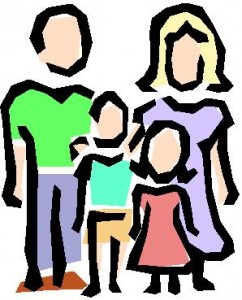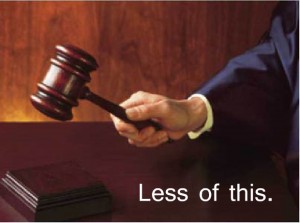Recently, the folks at Babble.com asked the question “Would you tell a stranger if you thought her child might be autistic?”
 Depending on your convictions, you would likely answer it pretty quickly, one way or another but after putting some more thought into it…. well, let’s just say there are some very good arguments for saying yes or no.
Depending on your convictions, you would likely answer it pretty quickly, one way or another but after putting some more thought into it…. well, let’s just say there are some very good arguments for saying yes or no.
As an example, let’s say you go to a community event where you meet new people and all of the children are playing. One child is not playing with the others, aligning toys in a row, making repetitive actions and the mother seems oblivious to any of this. She just thinks that her child is going through a phase or is “quirky” (we’ve all heard that one, right?).
Do you say something to her?
I’d like to go over some of the thoughts on this:
It’s none of your business
One of the most obvious answers and likely to be the most common is that it’s none of your business. They’re not friends, family.. you don’t know them. If they don’t know, that’s their problem. Let them figure it out in due course.
In theory, if you believe in that sort of thing, everything happens for a reason. If you interfere, you may be altering their course which could have been set for a reason.
But then one could argue.. perhaps you were there, at that time, to witness the autistic tendencies as part of that “everything happens for a reason” path and you were meant to say something…. hmm….
Either which way, is it your place to be making such assumptions of other people?
Will she be offended?
Most of us would assume that acting on behalf of your best interests would be a welcome and appreciated action however we all know better. Parents don’t appreciate other people pointing out their children’s flaws, much less giving them a label… certainly if that label is associated with a disability.
Some parents would even go so far as to hear “retard” in the place of “autism” and be ready to fight you for saying such a thing. Rightly so, the “r” word is not acceptable but many people still think that it and autism are the same thing.
Early intervention is passing them by
With every day spent in this “phase”, they miss valuable opportunities at getting treatments, therapies, financial aides, a shot at school support (IEPs) and so on. They are letting very valuable time slip by which means that in this case, ignorance is not bliss.
We all know the motto and there’s even a news story now that explains it well in terms of insurance coverage: Pay Now or Pay Later
Indeed, it is true. If that mother makes no effort to help her child…. what will the child’s future be like? If you don’t say something… their future could cost them a lot more than what some therapy would cost them now.
Are you certain of their situation?
If it’s a total stranger, chances are you don’t know. This person could be in denial, which means they know but don’t accept it, they could know but just not want to tell others (“a phase” sounds so much nicer than “disorder”) or this person could truly just be oblivious.
You really don’t know.
You also really don’t know if it’s actually Autism. Perhaps it’s something else (yes, there are other disorders which look similar). Perhaps, and this may shock you, it actually is just a phase. Yes, these things can be a phase in some children that they just move on from.
If you’re not a trained professional, and even then, it’s iffy, is it really your place to make all of these assumptions about their situation?
A responsibility to each other and our community
If you saw someone about to put their hands into a wood chipper… and you knew they’d lose their hands and struggle for the rest of their lives from that moment on… would you do something to stop it?
Do you have a responsibility to help others? Well, in the case of physical harm or death (dangerous situations), yes you do. In fact, you could be arrested and charged if you do nothing…. unless you’d be putting yourself in harms way to do it. Anyway.. you get my point.
In this case, it’s obviously not that black and white and Autism certainly isn’t life or death (although some would argue that with the number of wandering cases in the news continuing to increase).
But for the future of that child, maybe even the parents (if the child remains dependent for life) and even for the community around you that may have to pay for this child should he end up in a care home… if you say something now, you could help avoid all of that.
If you say something, the parent listens, a diagnosis is made, resources made available and all goes well…. the child’s life, parent’s life and even the community itself could benefit.
Conclusion – It Depends
Ultimately, there is no right or wrong answer.
Some situations are more obvious than others, some people seem more receptive than others, some people are better at broaching the subject with others… so the answer has to be… it depends.
Still though, I think the odds are that no.. you shouldn’t. There are more reasons not to than there are reasons to do it.
It’s unfortunate that autism still has such a stigma attached to it that suggesting such a thing would be so offensive.
Perhaps, as society grows and awareness (also understanding and acceptance) of Autism increases, maybe then it would be more acceptable to talk to a stranger about it like that.
I dream of a day when people are aware and unafraid to hear that their child may have Autism. Not that Autism is such a good thing but they know more about it and more about what to do should their child be diagnosed with it.
Right now, it’s still very much unknown among the general population. It’s a mystery. People know there is no cure. People know that it’s very expensive for therapies and treatments. People don’t know what Autism really is or that some people do live a very full and rewarding life with Autism.
With further education, with further understanding and acceptance, perhaps the answer to this question will be far more obvious… and far more positive. And when that happens, everyone will benefit from the kind word of a thoughtful stranger who only wanted to help.












